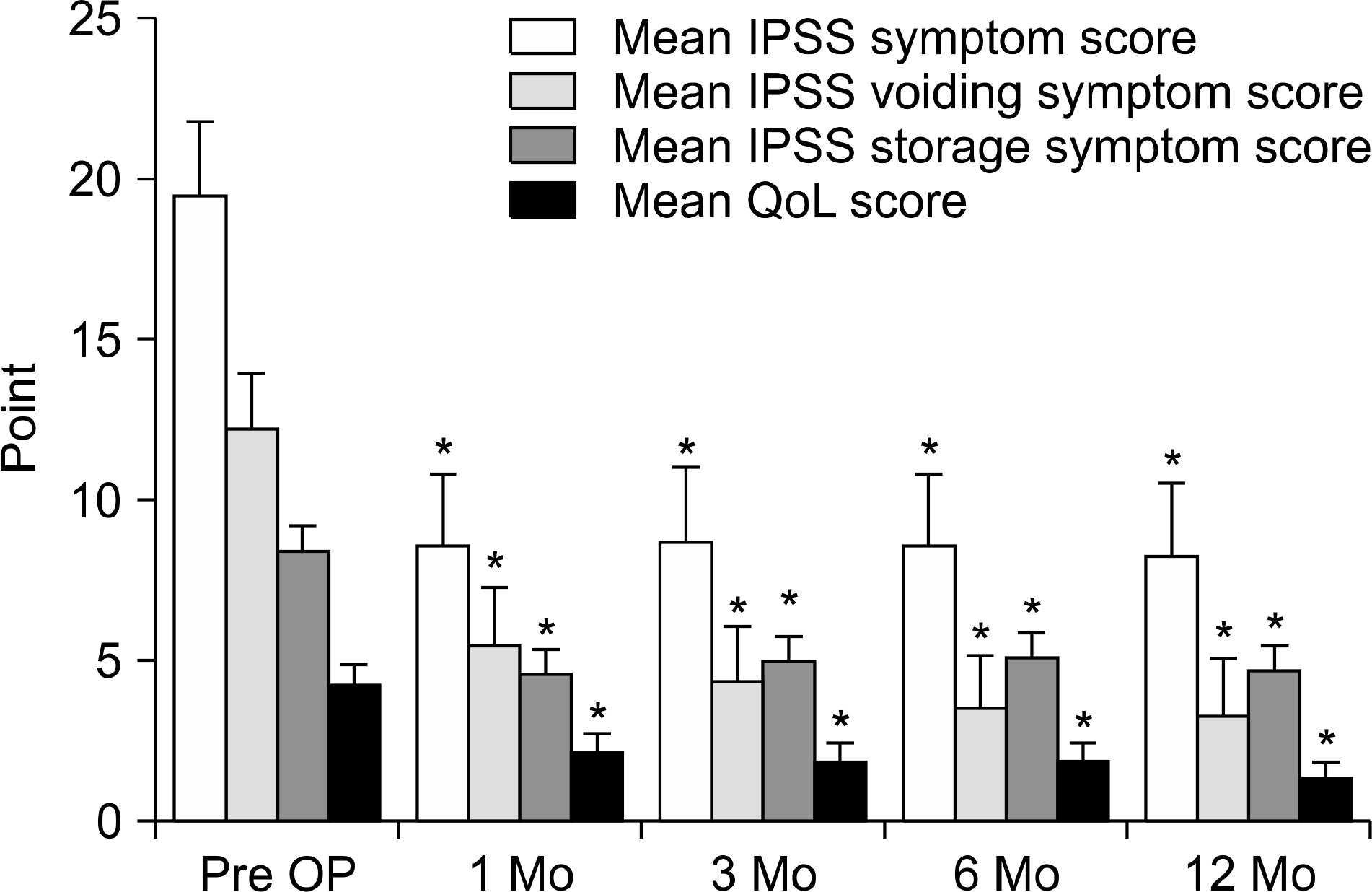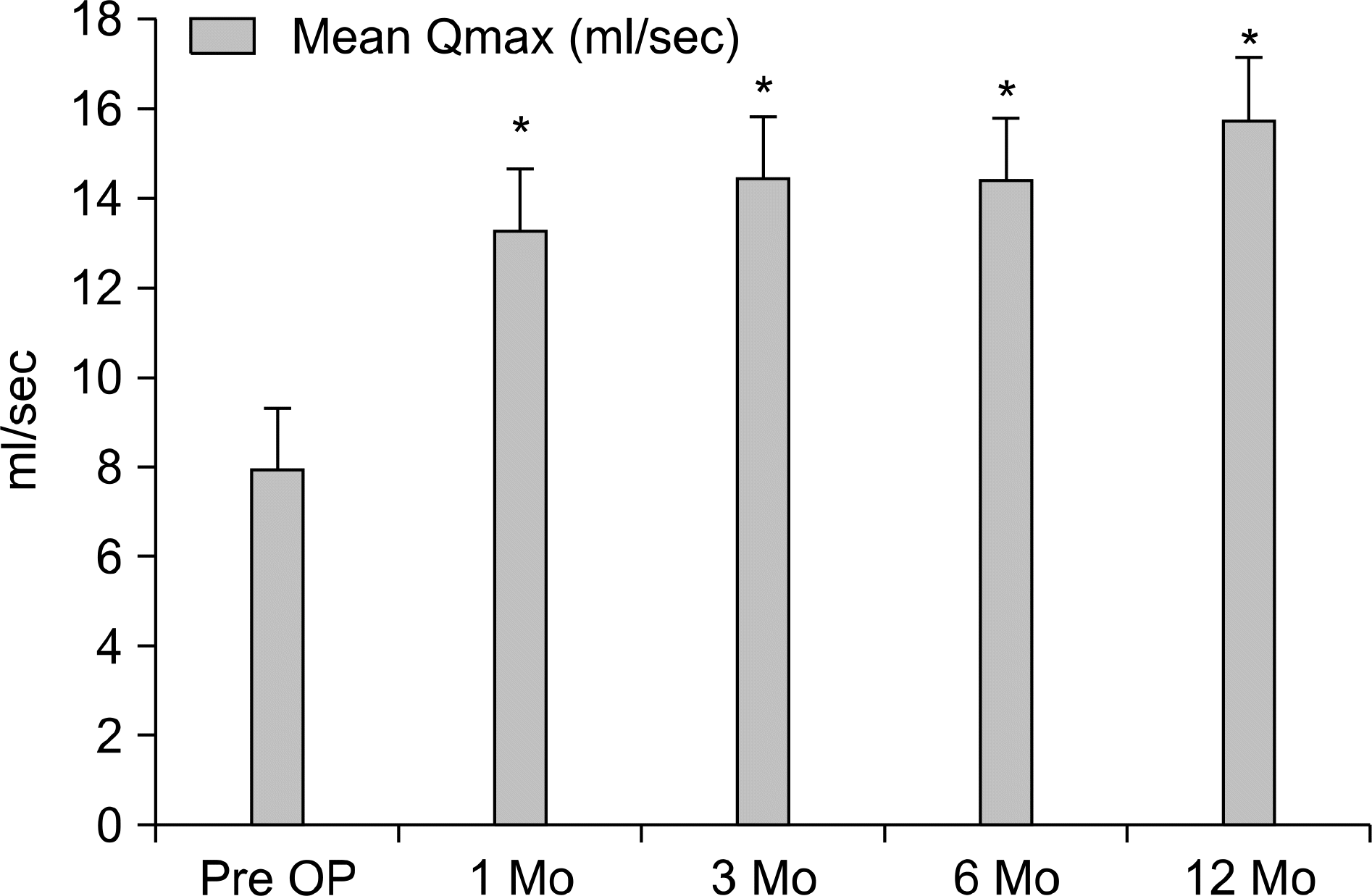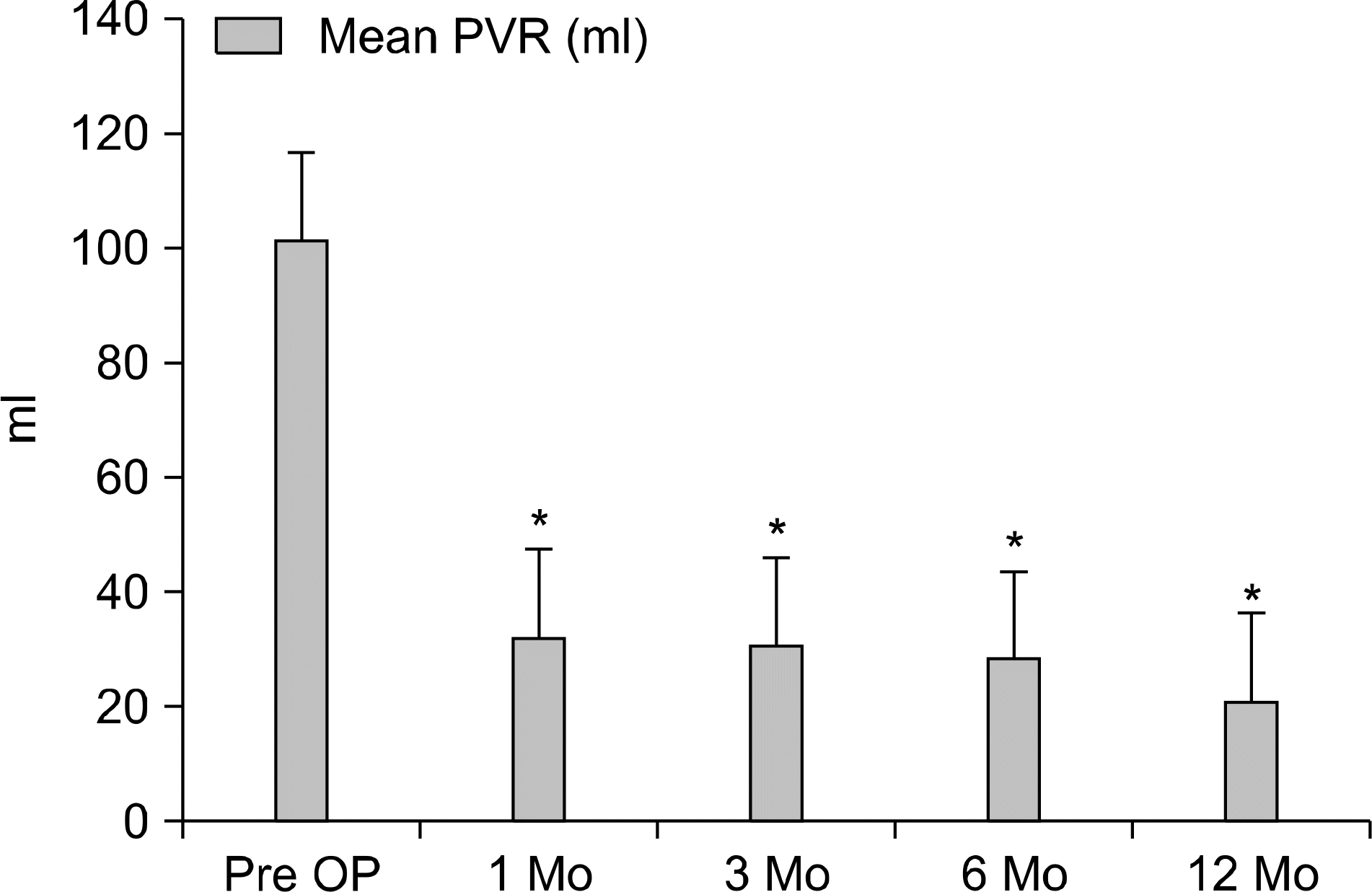Abstract
Purpose
Several studies and papers have reported good short-term results for using 120W HPS laser PVP. Here we report the short-term and longterm clinical outcomes analysis with efficacy and safety of 120W HPS laser PVP for the treatment of BPH.
Materials and Methods
We performed a retrospective clinical analysis of 357 patients, who underwent 120W HPS laser PVP for the treatment of BPH from April, 2009 to Feb. 2011. The IPSS, Qmax and PVR values were evaluated preoperatively and postoperatively.
Results
The mean age at the surgery; 70.35±8.28, mean prostate size; 46.56±21.11 ml, and mean PSA was 4.16±4.35 ng/ml. Mean operation time was 41.8±34.1 min, and mean lasing time was 19.8±11.3 min. Mean applied energy was 134,294.9±225,211.5 J. Thirty cases of co-operation were done. Mean catheter indwelling time was 0.84±0.36 day, and mean hospital stay was 1.1±0.2 day. The blood loss was minimal so transfusions were not needed. The baseline IPSS-sum; 19.61±9.13, QoL score; 4.28±1.02, Qmax; 7.94±5.51 ml/sec, PVR; 101.62±102.58 ml, At 1 month, IPSS-sum; 8.64±7.34, QoL score; 2.19±1.48, Qmax; 13.32±8.94 ml/sec, PVR; 32.54±46.07 ml was noted. At 12 months, IPSS-sum; 8.33±5.04, QoL score; 1.33±1.08, Qmax; 15.75±2.90 ml/sec, PVR; 21.56±31.28 ml was noted. Within 1 month of operation, 18 cases of dysuria and 27 cases of retention were reported but these were resolved with medication and observation. Compared with preoperative values, there were statistical improvements after the operation.
Go to : 
REFERENCES
1). Berry SJ, Coffey DS, Walsh PC, Ewing LL. The development of human benign prostatic hyperplasia with age. J Urol. 1984; 132:474–9.

2). Levy A, Samraj GP. Benign prostatic hyperplasia: when to'watch and wait,'when and how to treat. Cleve Clin J Med. 2007; 74(Suppl 3):S15–20.
3). De la Rosette J, Alivizatos G, Madersbacher S, Perachino M, Thomas D, Desgrandchamps F, et al. EAU guidelines on benign prostatic hyperplasia (BPH). Eur Urol. 2001; 40:256–63.

4). Roehrborn CG, Bartsch G, Kirby R, Andriole G, Boyle P, de la Rosette J, et al. Guidelines for the diagnosis and treatment of benign prostatic hyperplasia: a comparative, international overview. Urology. 2001; 58:642–50.

5). Borboroglu PG, Kane CJ, Ward JF, Roberts JL, Sands JP. Immediate and postoperative complications of transurethral prostatectomy in the 1990s. J Urol. 1999; 162:1307–10.

6). Rassweiler J, Teber D, Kuntz R, Hofmann R. Complications of transurethral resection of the prostate (TURP)–incidence, management, and prevention. Eur Urol. 2006; 50:969–79.

7). Reich O, Gratzke C, Stief CG. Techniques and longterm results of surgical procedures for BPH. Eur Urol. 2006; 49:970–8.

8). Malek RS, Kuntzman RS, Barrett DM. High power potassium-titanyl-phosphate laser vaporization prostatectomy. J Urol. 2000; 163:1730–3.

9). Malek RS, Kuntzman RS, Barrett DM. Photoselective potassium-titanyl-phosphate laser vaporization of the benign obstructive prostate: observations on longterm outcomes. J Urol. 2005; 174:1344–8.

10). Spaliviero M, Araki M, Wong C. Short-term outcomes of Greenlight HPS laser photoselective vaporization prostatectomy (PVP) for benign prostatic hyperplasia (BPH). J Endourol. 2008; 22:2341–7.

11). Wong C, Araki M, Tonkin JB. High-power potassium-titanyl-phosphate or lithium triboride laser photoselective vaporization prostatectomy for benign prostatic hyperplasia: a systematic approach. J Endourol. 2007; 21:1141–4.

12). Yu X, Elliott SP, Wilt TJ, McBean AM. Practice patterns in benign prostatic hyperplasia surgical therapy: the dramatic increase in minimally invasive technologies. J Urol. 2008; 180:241–5.

13). Costello AJ, Bowsher WG, Bolton DM, Braslis KG, Burt J. Laser ablation of the prostate in patients with benign prostatic hypertrophy. Br J Urol. 1992; 69:603–8.

14). Ruszat R, Seitz M, Wyler SF, Muller G, Rieken M, Bonkat G, et al. Prospective single centre comparison of 120 W diode pumped solid state high intensity system laser vaporization of the prostate and 200 W high intensive diode laser ablation of the prostate for treating benign prostatic hyperplasia. BJU Int. 2009; 104:820–5.
15). Milam DF, Smith Jr JA. Urologic Laser Surgery. Gillenwater JY, Grayhack JT, Howards SS, Mitchell ME, editors. Adult and pediatric urology. 4th ed.Philadelphia: Lippincott Williams & Wilkins;2002. p. 291–317.
16). Te AE, Malloy TR, Stein BS, Ulchaker JC, Nseyo UO, Hai MA, et al. Photoselective vaporization of the prostate for the treatment of benign prostatic hyperplasia: 12-month results from the first United States multicenter prospective trial. J Urol. 2004; 172:1404–8.

17). Bachmann A, Ruszat R, Wyler S, Reich O, Seifert HH, Muller A, et al. Photoselective vaporization of the prostate: the basel experience after 108 procedures. Eur Urol. 2005; 47:798–804.

18). Hwang CH, Cho CK, Lee YK, Hong SJ. Comparative analysis of short-term efficacy and complication of photoselective vaporization for benign prostatic hyperplasia which was classified by prostate size. Korean J Urol. 2007; 48:826–31.

19). Park JS, Kim CS, Ahn H, You CH, Hong B, Ahn TY, et al. Comparison of treatment outcomes between photoselective vaporization and transurethral resection of the prostate for benign prostatic hyperplasia. Korean J Urol. 2007; 48:297–303.

20). Ko DW, Jeong BC, Son H. Initial experiences with a new 120 W greenlightTM high-power system for photoselective vaporization of the prostate for the treatment of benign prostatic hyperplasia in Korea. Korean J Urol. 2009; 50:1089–94.
21). Bachmann A, Schurch L, Ruszat R, Wyler SF, Seifert HH, Muller A, et al. Photoselective vaporization (PVP) versus transurethral resection of the prostate (TURP): a prospective bi-centre study of perioperative morbidity and early functional outcome. Eur Urol. 2005; 48:965–71. discussion 972.

22). Alivizatos G, Skolarikos A, Chalikopoulos D, Papachristou C, Sopilidis O, Dellis A, et al. Transurethral photoselective vaporization versus transvesical open enucleation for prostatic adenomas >80 ml: 12-mo results of a randomized prospective study. Eur Urol. 2008; 54:427–37.
23). Spaliviero M, Araki M, Culkin DJ, Wong C. Incidence, management, and prevention of perioperative complications of GreenLight HPS laser photoselective vaporization prostatectomy: experience in the first 70 patients. J Endourol. 2009; 23:495–502.
Go to : 
 | Fig. 1.Postoperative IPSS scores F/U (∗p<0.05). Postoperative International prostate symptom scores follow-up after 120W PVP within a follow-up of 12 months. Bars represent mean values of groups. Definition: ∗p<0.05, IPSS: International prostate symptom score, QoL: quality of life. Statistic data information; Pre OP: n=357, 1 Mo: n=341, 3 Mo: n=301, 6 Mo: n=258, 12 Mo: n=219. |
 | Fig. 2.Postoperative Qmax F/U (∗p<0.05). Postoperative Peak Flow follow-up after 120W PVP within a follow-up of 12 months. Bars represent mean value of group. Definition: ∗p <0.05, Qmax: peak flow. Statistic data information; Pre OP: n=357, 1 Mo: n=341, 3 Mo n=301, 6 Mo: n=258, 12 Mo: n=219. |
 | Fig. 3.Postoperative PVR F/U (∗p<0.05). Postoperative Post-Voiding Residual volume follow-up after 120W PVP within a follow-up of 12 months. Bars represent mean value of group. Definition: ∗p<0.05, PVR: Post-Voiding residual volume. Statistic data information; Pre OP: n=357, 1 Mo: n=341, 3 Mo: n=301, 6 Mo: n=258, 12 Mo: n=219. |
Table 1.
Preoperative characteristics




 PDF
PDF ePub
ePub Citation
Citation Print
Print


 XML Download
XML Download